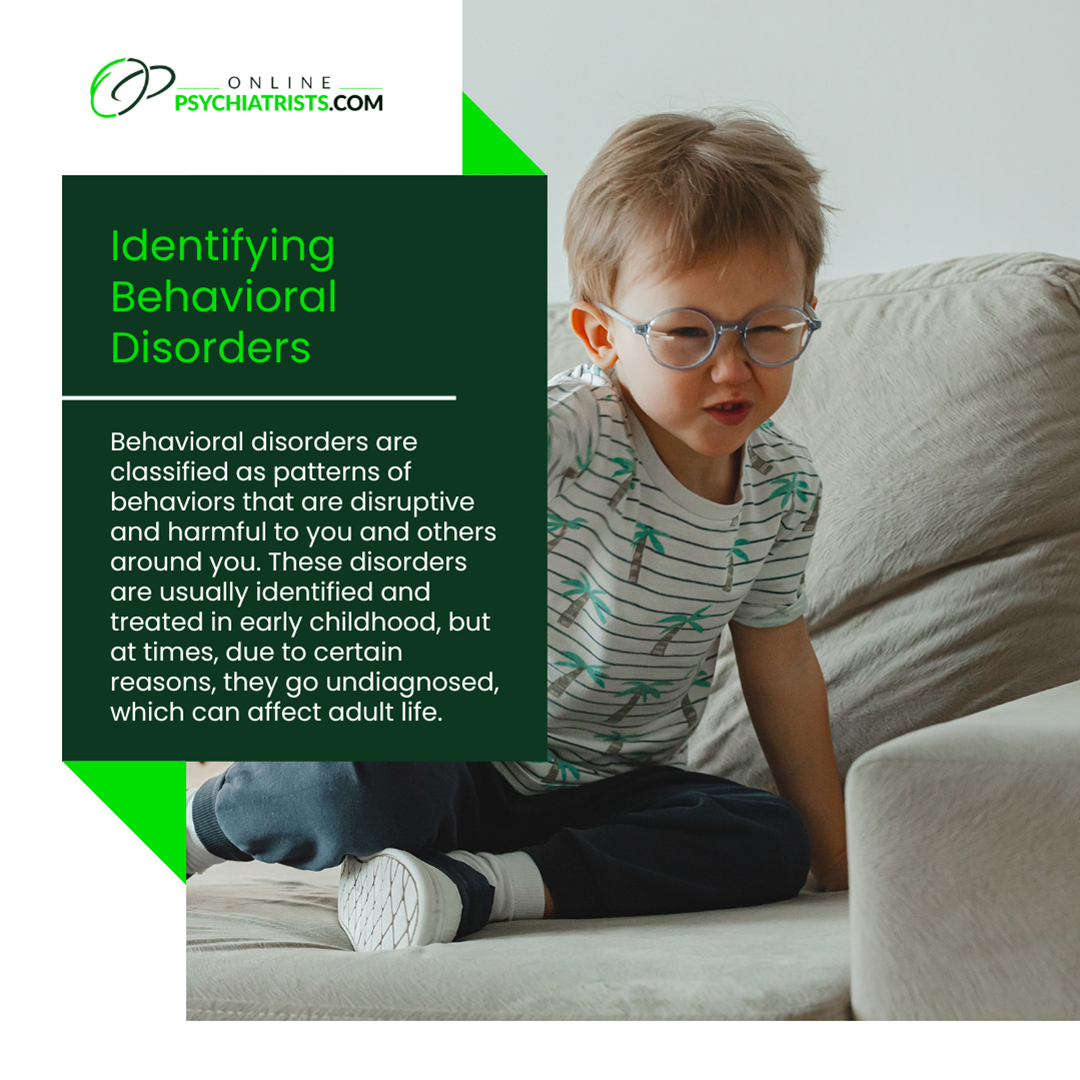

Every individual is different with unique behavioral characteristics, but if these behaviors become difficult to manage and challenging, it’s time to pay attention. Sometimes behavioral issues can be a sign of a mental disorder or illness that needs medical guidance. Learning about childhood behavioral disorders and how they can affect development or adult behaviors can help to step out from the damaging symptoms and seek the best treatment for a healthy, happy life. Call NYC psychiatry today to schedule an appointment with Dr. Zlatin Ivanov to identify which behaviors are not accepted and what can be done for your unique mental health needs. Dr. Ivanov works with you to develop a personalized treatment plan that focuses on complete recovery and long-term well-being.
Behavioral disorders can affect an individual’s thoughts, moods, behaviors, and ability to relate to others and function normally. These disorders may be short-term or chronic, depending on the symptoms you are experiencing or the problems they are causing.
Whether you were diagnosed in childhood or are concerned about warning signs in adulthood, the best way to treat a behavioral disorder is to recognize symptoms and be fully informed on what to do.
Read more: Marriage Counseling: All You Need To Know
Behavioral disorders are classified as patterns of behaviors that are disruptive and harmful to you and others around you. These disorders are usually identified and treated in early childhood, but at times, due to certain reasons, they go undiagnosed, which can affect adult life. Behavioral disorders can make it difficult for you to maintain healthy relationships, regular employment, and other functions of a normal adult.
Some of the risk factors for developing a behavior disorder may include:

Discussed here are some of the common behavioral disorders in children and adults.
Struggling with antisocial behavior, difficulty following rules, continuous patterns of violence, and inability to show empathy to others are signs of conduct disorder. This disorder is usually diagnosed in teenage, particularly during the age of 16. Individuals with CD are more likely to get hurt and struggle to get along with their classmates.
Characteristics of conduct disorder include:
Other signs of conduct disorder are a lack of remorse or any emotional response for doing wrong.
Continuous defiance and disobedience towards people in authority is a sign of ODD. It is a natural part of toddler and adolescent development that begins with behaviors like throwing tantrums and defiance that lasts into adulthood. However, as such conduct becomes aggressive and frequent, ODD diagnosis is made.
Characteristics of ODD include:
If it is not identified and treated at an early age, ODD can present itself in later years as feelings of anger for the world, disliking people with authority, especially at work, and becoming defensive when presented with opposition or feedback.
Read more: What Is ADHD Paralysis – Do I Have It?
ADHD it is the most common behavioral problem reported among children, adolescents, and adults. It can affect many aspects of life, including academic and professional achievements, interpersonal relationships, and daily functioning.
Signs and symptoms of ADHD include:
When these symptoms are not managed or diagnosed timely, they can lead to problems like:
Diagnosis of ADHD is based on the symptoms that have occurred over some time and are noticeable over the past six months. While ADHD can be diagnosed at any age, the disorder begins in childhood.
Read more: It’s Not Just in Your Head: How Your Anxiety Might Be Affecting You Physically
It is a common, chronic, and long-lasting disorder in which an individual has unwanted and uncontrolled, recurring thoughts or obsessions and behaviors or compulsions they feel like repeating over and over. It may lead to behaviors such as constant washing and cleaning, repeating phrases or prayers, following strict routines, or repetitively counting and checking. It causes a feeling of drowning in a constant state of worry.
Obsessions can include:
Even when they don’t want to think about or do those things, people suffering from OCD cannot seem to stop or control their obsessions or compulsions.
People with OCD have thoughts or actions that:
OCD is an overwhelming condition that makes it difficult to function normally as it invades and disrupts your life. It can also lead to other complications like bipolar disorder, depression, and anxiety.
It is a form of addiction that involves a compulsion to engage in rewarding non-substance-related behavior despite its negative consequences to an individual’s physical, mental, social, or financial well-being. Behavioral dependence does not involve addiction to a substance but addiction to the behavior or feeling experienced by acting out the behavior.
There are many behaviors one can become addicted to, including:
Addiction to one or more of these behaviors leads to neglecting family and work responsibilities. Some people use these addictions to cope with emotions and to deny or hide problems despite wanting to stop or cut back. They can result in problems with finances and relationships and threaten safety and overall health.
Early identification is essential for treating the condition and improving the quality of life of the individuals affected as well as their families. Early intervention programs for children who show signs of mental illness can prevent deterioration and further development of mental illness.
No matter what behavior disorder you are living with, it can be managed and treated with medication, psychotherapy, and counseling, depending on your specific needs.
Do not hesitate to seek professional help if you or a loved one is struggling with a behavior disorder.
Untreated behavioral concerns can lead to short and long-term impacts on an individual’s personal and professional life or affect a child’s growth and ability to adjust in society. Suspension or expulsion from school or workplace and failure to maintain normal relationships are some of the problems that can result from behavioral disorders. Dr. Zlatin Ivanov focuses on identifying and treating common behavioral issues that children and adults face as early as possible to manage their symptoms and reduce the risk of complications.

Dr. Zlatin Ivanov, MD, is an adult psychiatrist specializing in addiction treatment, ADHD, anxiety, depression, and OCD. He offers exceptional talk therapy and medication management through online video conferencing.
Dr. Ivanov is double board certified in Psychiatry and Clinical Neurology and a member of the American Psychiatric Association. His medical career is colored by many outstanding contributions to medicine, including several publications, research, and scientific presentations. An attending psychiatrist at Woodhull Medical Center in Brooklyn, NY, and Bellevue Hospital Center in New York City, he takes the time to listen to patients and makes sure they know he is committed to their unique situation.
 Our Locations
Our Locations
The Chrysler Building
405 Lexington Ave, #2601
New York, NY, 10174 (map)
300 Carnegie Center Drive #150K,
Princeton, NJ, 08540 (map)
701 Brickell Avenue, 1550#A,
Miami, FL, 33131 (map)